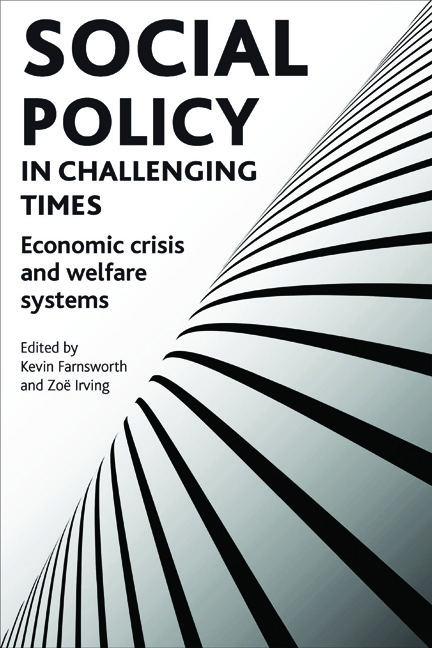Book contents
- Frontmatter
- Contents
- List of figures and tables
- Notes on contributors
- Acknowledgements
- one Varieties of crisis
- two The economic crisis and paradigm change
- three From financial crisis to fiscal crisis
- four Credit crunch, inequality and social policy
- five Global social policy responses to the economic crisis
- six Poverty, the crisis and social policy responses developing countries in developing countries
- seven South Korea after the 1997 economic crisis: a ‘paradigm shift’?
- eight China's response to crisis: what role for social policy?
- nine Tiptoeing through crisis? Re-evaluating the German social model in light of the global recession
- ten Ireland and the impact of the economic crisis: upholding the dominant policy paradigm
- eleven Waving not drowning: Iceland, kreppan and alternative social policy futures
- twelve Experiences from two financial crises in the Nordic welfare states: 1990-93 and 2008-10 compared
- thirteen Social policy and the recent economic crisis in Canada and the United States
- fourteen From economic crisis to a new age of austerity: the UK
- fifteen Responding to the challenges: some concluding remarks on welfare futures in changed circumstances
- Bibliography
- Index
five - Global social policy responses to the economic crisis
Published online by Cambridge University Press: 07 September 2022
- Frontmatter
- Contents
- List of figures and tables
- Notes on contributors
- Acknowledgements
- one Varieties of crisis
- two The economic crisis and paradigm change
- three From financial crisis to fiscal crisis
- four Credit crunch, inequality and social policy
- five Global social policy responses to the economic crisis
- six Poverty, the crisis and social policy responses developing countries in developing countries
- seven South Korea after the 1997 economic crisis: a ‘paradigm shift’?
- eight China's response to crisis: what role for social policy?
- nine Tiptoeing through crisis? Re-evaluating the German social model in light of the global recession
- ten Ireland and the impact of the economic crisis: upholding the dominant policy paradigm
- eleven Waving not drowning: Iceland, kreppan and alternative social policy futures
- twelve Experiences from two financial crises in the Nordic welfare states: 1990-93 and 2008-10 compared
- thirteen Social policy and the recent economic crisis in Canada and the United States
- fourteen From economic crisis to a new age of austerity: the UK
- fifteen Responding to the challenges: some concluding remarks on welfare futures in changed circumstances
- Bibliography
- Index
Summary
Introduction: discursive struggle matters in global social policy
Global social policy (GSP) studies has emphasised the contest and conflict regarding advice given to countries about their social policy by a diverse range of global players, including intergovernmental organisations. Thus:
The ideas about desirable national social policy carried and argued for by the international organisations … reveals something approaching a ‘war of position’ between those agencies … who have argued for a more selective, residual role for the state together with a larger role for private actors in health, social protection and education provision and those who took the opposite view. This division of opinion often reflected a disagreement as to whether the reduction of poverty was a matter of targeting specific resources on the most poor or whether it was a matter of major social and political-institutional change involving a shift in power relations and a significant increase in redistribution from rich to poor. (Deacon, 2007, p 171)
This analytical framework draws on the concept of ‘global policy advocacy coalitions’ as, for example, used by Orenstein (2005, 2008) to analyse the development and selling to the world of the global pension policy preferred by the World Bank since 1990. Here, transnational actors formed coalitions linking scholars in a particular epistemic community, pension providers, international organisations, regional development banks and others to win governments to this view. GSP studies has at the same time argued for the importance of international networks of knowledge-based experts who play a part in helping international organisations shape the issues for collective debate. This chapter draws on this framework of analysis to address the current global economic crisis and the ideas about social policy being articulated by such global actors and networks.
During the 20 lost years of global neoliberalism, social policy in the context of development became relegated to a residual safety net approach (Deacon et al, 1997; Deacon, 2007; Mkandawire, 2004; de Haan, 2007). The dominant focus of the World Bank, the International Monetary Fund (IMF) and much of the aid industry, supported by the Millennium Development Goals (MDG) approach of the United Nations (UN), was focused only on the poorest of the poor, working with the erroneous assumption that the question of poverty could be solved without addressing issues of equity, social inclusion and the role of the state in fostering a developmental project for the benefit of all social groups.
- Type
- Chapter
- Information
- Social Policy in Challenging TimesEconomic Crisis and Welfare Systems, pp. 81 - 100Publisher: Bristol University PressPrint publication year: 2011

